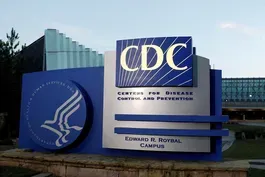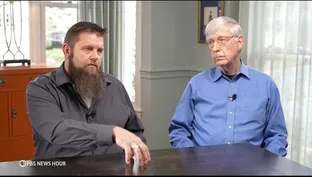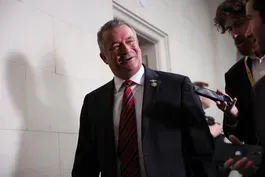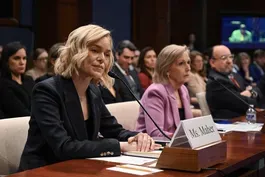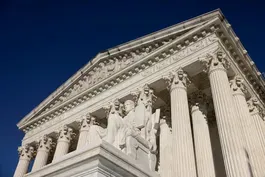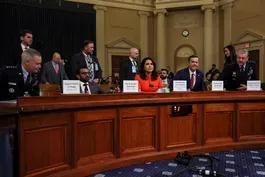
Signal chat a massive security breach, Goldberg says
Clip: 3/26/2025 | 6m 44sVideo has Closed Captions
Administration trying to avoid that Signal chat is massive security breach, Goldberg says
Details about U.S. military strikes being discussed on Signal have shocked many in the national security community. But President Trump called the whole episode a "witch hunt" and said Defense Secretary Hegseth "had nothing to do with this." Geoff Bennett discussed more with Jeffrey Goldberg, editor-in-chief of the Atlantic and moderator of Washington Week.
Problems with Closed Captions? Closed Captioning Feedback
Problems with Closed Captions? Closed Captioning Feedback
Major corporate funding for the PBS News Hour is provided by BDO, BNSF, Consumer Cellular, American Cruise Lines, and Raymond James. Funding for the PBS NewsHour Weekend is provided by...

Signal chat a massive security breach, Goldberg says
Clip: 3/26/2025 | 6m 44sVideo has Closed Captions
Details about U.S. military strikes being discussed on Signal have shocked many in the national security community. But President Trump called the whole episode a "witch hunt" and said Defense Secretary Hegseth "had nothing to do with this." Geoff Bennett discussed more with Jeffrey Goldberg, editor-in-chief of the Atlantic and moderator of Washington Week.
Problems with Closed Captions? Closed Captioning Feedback
How to Watch PBS News Hour
PBS News Hour is available to stream on pbs.org and the free PBS App, available on iPhone, Apple TV, Android TV, Android smartphones, Amazon Fire TV, Amazon Fire Tablet, Roku, Samsung Smart TV, and Vizio.
Providing Support for PBS.org
Learn Moreabout PBS online sponsorshipGEOFF BENNETT: And, tonight, President Trump called the whole episode a witch-hunt and said Defense Secretary Pete Hegseth -- quote -- "had nothing to do with this."
We're joined now by Jeffrey Goldberg, editor in chief of "The Atlantic" and moderator of "Washington Week" here on PBS.
Geoff, it's good to see you.
So, help us understand first your decision to release the strike plans, which you were mistakenly made privy to, in light of the days of denials and downplaying from the administration about the content of the signal messages.
JEFFREY GOLDBERG: Yes, that's a good question.
We -- yesterday, when the president and various other national security officials said that there was nothing sensitive in this material and accused us of lying about the nature of the material,we began to think maybe we should just put this out there so that the American people can see it and make their own conclusions, draw their own conclusions.
What we did all yesterday was reach out to various agencies, CIA, DNI, NSC and so on, and ask them specifically, even though the president said there was nothing to see here, we wanted to just be sure, obviously, that we were not releasing anything that could do harm to Americans in the field.
Most agencies didn't reply.
Some did.
We did -- in fact, the CIA did, in fact, ask us not to publish one of the texts, and we agreed not to do it because we obviously would want to be responsible.
But, I mean, it's interesting that the CIA director says there's nothing sensitive or classified in this, but his own agency asked us not to publish one of these texts.
And, this morning, we decided to publish these texts so people can see for themselves what was going on in the Signal chat that I saw, obviously inadvertently, because I was included in this secret Signal chain.
And these are texts, and especially the Pete Hegseth text that you referred -- that was referred to earlier, saw that two hours before the beginning of a strike.
Obviously, when I was seeing that, one of the thoughts that was crossing my mind was, what if it wasn't me who was mistakenly included on this chain, but what if it was somebody who was friendly to the Houthis or to their Iranian sponsors or to Russia or China?
And I think the point is well-taken.
This needlessly endangered Americans who are already in positions of danger.
This added a layer of danger that was completely unnecessary and reckless.
GEOFF BENNETT: Well, let's talk more about the substance of these messages, because, as you noted, well before the first bombs fell, the defense secretary is detailing the strike plan hour by hour.
This is before the pilots on the attack mission were even airborne.
And then, after the strike, Mike Waltz sends a message with what appears to be real-time intelligence about the conditions on the ground.
He writes: "Building collapsed.
Had multiple positive I.D."
What stands out to you about that?
JEFFREY GOLDBERG: Well, what stands out is that, at this hearing, some of the Republicans were arguing that no sources or methods were disclosed in this.
Sources and methods is this shorthand in the intelligence community for where information comes from and how it's developed.
Now, quite obviously, you don't want the Houthis on the ground in Yemen to understand that there may be humans on the ground who are observing them or other forms of maybe technical surveillance.
Obviously, on the one hand, Houthis generally understand that there are probably satellites and drones watching them.
But you don't want to indicate in any way, shape or form -- and obviously all intelligence professionals agree on this.
You don't want to indicate in any way, shape or form that you know, that we do -- you know in real time what's going on, on their location.
That would cause them obviously to shift patterns, to go into hiding or do other things that obviously make the mission harder.
The whole point here is, why would you possibly put all of that material into a messaging app that is not secured by the government?
It's just -- I mean, even days later, or a week-and-a-half after I first saw these messages, it's still sort of mind-boggling.
GEOFF BENNETT: Well, the White House is now quibbling about the definition of war plans and about what constitutes classified information.
Here's what the defense secretary had to say about that earlier today.
Take a look.
PETE HEGSETH: Nobody is texting war plans.
I noticed this morning out came something that doesn't look like war plans.
And, as a matter of fact, they even changed the title to attack plans because they know it's not war plans.
There's no units, no locations, no routes, no flight paths, no sources, no methods, no classified information.
GEOFF BENNETT: So, in the minute-and-a-half we have left, first, how does that strike you?
And then, secondly, why did "The Atlantic" choose the phrase attack plans in the headline today after using the phrase war plans yesterday?
Because that's something that the White House and the DOD comms shop were eager to point out today.
JEFFREY GOLDBERG: Yes.
Attack plan is actually worse.
War plan actually refers to -- and I think that for -- in the vernacular, they are interchangeable.
Obviously, this is a plan to use military vehicles and missiles and other components of U.S. military to kill our enemies.
The attack plan actually refers to more technical aspects of what is done in an attack.
A war plan really actually refers more to strategy.
So, I changed the word.
We use it interchangeably, in fact.
But I changed the word because attack plan actually gets to the heart of what Pete Hegseth was doing, which was giving a minute-by-minute countdown of what they were hoping to do.
But, again, that's a -- this is a -- that's a sideshow.
They are trying to avoid the issue at hand, which is that they engaged in a massive security breach.
And this would not have been discovered had they not accidentally shared their Signal channel with me, which is in itself evidence of a massive security breach.
So they can quibble about semantics, but the point is, is that they put information out into the world that they shouldn't be putting out on those channels.
GEOFF BENNETT: Jeffrey Goldberg of "The Atlantic" and "Washington Week," thanks for joining us.
JEFFREY GOLDBERG: Thank you.
CDC the latest agency to face leadership and budget shakeup
Video has Closed Captions
CDC the latest federal agency to face leadership shakeup and cuts (6m 10s)
Ex-NIH director, trucker explore bridging COVID divisions
Video has Closed Captions
Ex-NIH director and truck driver explore how to bridge divisions deepened by the pandemic (9m 58s)
GOP Rep. Bacon says Signal chat contained classified info
Video has Closed Captions
'Just own it': GOP Rep. Bacon says Signal chat contained classified info (7m 18s)
News Wrap: Court upholds Alien Enemies Act deportation block
Video has Closed Captions
News Wrap: Appeals court upholds block on Trump deportations under Alien Enemies Act (5m 48s)
NPR, PBS heads face funding questions during House hearing
Video has Closed Captions
NPR and PBS heads face sharp questioning about federal funding during House hearing (6m 54s)
Supreme Court upholds Biden ghost gun regulation
Video has Closed Captions
Supreme Court upholds Biden regulation making ghost guns easier to trace (4m 2s)
Trump officials face questions as details from chat revealed
Video has Closed Captions
Trump officials face more questions as new details from Yemen strike chat revealed (4m 31s)
Providing Support for PBS.org
Learn Moreabout PBS online sponsorshipMajor corporate funding for the PBS News Hour is provided by BDO, BNSF, Consumer Cellular, American Cruise Lines, and Raymond James. Funding for the PBS NewsHour Weekend is provided by...
